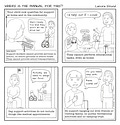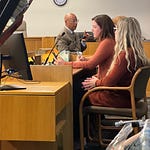Medicaid’s Home and Community Based Services are a wonderful thing in theory. But these supports — which in many states includes in-home caregivers — can be difficult to make work in practice, especially for children. Part of the issue, as illustrated this week by Lenore Eklund in her Where is the Manual for This?! editorial cartoon for this month, is the web of restrictions and limits on what exactly these hours can be used for. Some of them make sense, but most do not, especially in the context of a family and a child’s development.
The above restrictions and limits may not apply in all states, but these were taken directly from a presentation given by Oregon’s Office of Developmental Disabilities Services on Feb. 6. What are some restrictions and limits on disability supports that drive you nuts in your state? Post in the comments or reply to this email if you’re a subscriber.
Medical Motherhood’s news round up
Snippets of news and opinion from outlets around the world. Click the links for the full story.
• From PBS: “Supreme Court unanimously rules for deaf student in education case”
The Supreme Court ruled unanimously Tuesday for a deaf student who sued his public school system for providing an inadequate education. The case is significant for other disabled students who allege they were failed by school officials.
The case the justices ruled in involves Miguel Luna Perez, who attended public school in Sturgis, Michigan. Perez’s lawyers told the court that for 12 years the school system neglected the boy and lied to his parents about the progress he was making, permanently stunting his ability to communicate.
The justices ruled that after Perez and his family settled a complaint against the school system — with officials agreeing to pay for additional schooling and sign language instruction — they could pursue money damages under a different federal law. Justice Neil Gorsuch wrote in an eight-page opinion for the court that the case “holds consequences not just for Mr. Perez but for a great many children with disabilities and their parents.”
[…]Perez’s family and the school district ultimately settled the IDEA claims. The district agreed to pay for extra schooling and sign language instruction for Perez and his family, among other things, and he graduated from the Michigan School for the deaf in 2020. After the settlement, the family went to federal court and, under the ADA, sought monetary damages, which are not available under the IDEA.
Lower courts said Perez was barred from pursuing his ADA claims because of language in the IDEA, but the Supreme Court disagreed. Gorsuch wrote: “We clarify that nothing” in the IDEA “bars his way.”
• From Teen Vogue (Opinion by Alice Wong): “The ‘Unwinding’ of Medicaid Coverage Will Be Difficult for Disabled Americans, Leave More People Uninsured”
I’ve been on Medicaid since I turned 18. It has been a lifelinebecause it provides personal-care services that allow me to live in the larger community rather than in a private facility. For many Americans, though, Medicaid coverage is now at risk. Under the Consolidated Appropriations Act of 2023, states will resume redetermining eligibility for all Medicaid enrollees on April 1. That means an estimated 18 million people may lose their coverage in the next 14 months, including some people who enrolled during the pandemic, according to a report from the Urban Institute.
Like the White House’s plan to privatize COVID treatments and vaccines, Medicaid coverage is another public health emergency measure that’s been deemed no longer necessary. In early 2020, Congress enacted a rule that barred states from dropping people from Medicaid, thus ensuring access to health care during the pandemic. But now the government will allow the number of uninsured people to soar in an “unwinding” process that could have major consequences.
Every year, I have to go through a Medicaid redetermination process, which assesses my eligibility so that my coverage can be renewed. Even though I’ve been through this process seemingly countless times, when that thick packet from the county comes in the mail, it still creates a pit of dread in my stomach. One small error can be disastrous, resulting in what’s called “churn,” the gap in coverage that can lead to delays in care while people re-enroll — or people can fall through the cracks altogether. Administrative and procedural barriers can also lead to someone being dis-enrolled, with low-income people and people of color disproportionately at higher risk due to structural inequities.
• From the Virginia Mercury: “Feds identify ‘significant’ ongoing concerns with Virginia special education”
After failing to meet federal requirements to support students with disabilities in 2020, the Virginia Department of Education will remain under further review by the federal government after continuing to fall short in monitoring and responding to complaints against school districts, according to a letter from the U.S. Department of Education.
“We have significant new or continued areas of concerns with the State’s implementation of general supervision, dispute resolution, and confidentiality requirements” of IDEA, stated the Feb. 17 letter from the Office of Special Education Programs.
The U.S. Department of Education first flagged its concerns in a June 2020 “Differentiated Monitoring and Support Report” on how Virginia was complying with the Individuals with Disabilities Education Act, following a 2019 visit by the Office of Special Education Programs.
[…]The decision comes after the U.S. Department of Education announced in November that Fairfax County Public Schools, Virginia’s largest school district, failed to provide thousands of students with disabilities with the educational services they were entitled to during remote learning at the height of the COVID-19 pandemic.
Virginia is also facing a federal class-action lawsuit over claims that its Department of Education and Fairfax County Public Schools violated the rights of disabled students under IDEA.
Parents involved in the case said the Virginia Department of Education and Fairfax school board “have actively cultivated an unfair and biased” hearing system to oversee challenges to local decisions about disabled students, according to the suit.
[…]The federal government said if Virginia could not demonstrate full compliance with IDEA requirements, it could impose conditions on grant funds the state receives to support early intervention and special education services for children with disabilities and their families.
Medical Motherhood brings you quality news and information each Sunday for raising disabled and neurodivergent children. Get it delivered to your inbox each week or give a gift subscription. Subscriptions are free, with optional tiers of support. Thank you to our paid subscribers!
Follow Medical Motherhood on Facebook, Twitter, TikTok, Instagram or Pinterest. The podcast is also available in your feeds on Spotify and Apple Podcasts. Visit the Medical Motherhood merchandise store.
Do you have a story to share or an injustice that needs investigation? Tell me about it and it may become a future issue.
















Home help for your disabled child!*